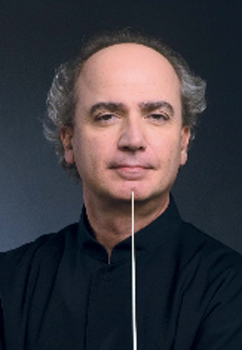Miami Symphony season leads off with strong Brahms, world premiere

Eduardo Marturet conducted the Miami Symphony Orchestra’s opening concert Sunday night at the Arsht Center.
The Miami Symphony Orchestra opened its season Sunday night at the Arsht Center with strong performances of two symphonic classics and the premiere of an attractive new score by one of the ensemble’s six composers-in-residence. Marking the tenth anniversary of conductor Eduardo Marturet’s association with the orchestra, the concert was a vivid display of Marturet’s skillfed work as an orchestra builder. The entire ensemble was in strong form, all sections playing with clarity and focus.
Marturet set a deliberate pace at the onset of Schubert’s Symphony No. 8 (the Unfinished) but, gradually, the opening movement gained power and momentum. The five unison double basses brought emphatic impact to the mysterious opening subject and the cellos’ light, resonant tone and supple phrasing beautifully conveyed the romance of the movement’s second theme. Marturet took an expansive approach to the Andante but maintained a firm line with fine detailing of dynamic contrasts. The violin section’s sweetness and warmth of tone were particularly notable.
Marturet dedicated the premiere of Echoes by Tulio Cremisini to the orchestra’s players, telling them to play their hearts out and indeed they gave their all to this appealing new work. Cremisini is the orchestra’s acting principal timpanist. A Latin Grammy Winner, composer of film and television scores and former member of Venezuela’s Simon Bolivar Symphony Orchestra, Cremisini has a real flair for colorful and idiomatic instrumental writing. The score suggests a Mediterranean Rachmaninoff with brooding, richly melodic writing that displayed the ensemble’s lush strings and finely pointed winds. A cross between a pops piece and full blown symphonic tone poem, Echoes deserves repeated performances.
Marturet has programmed Brahms’ Symphony No. 4 several times in the past. While previous performances were variable in quality and articulation, Sunday’s rendering was beautifully played and maintained a high level of intensity from the opening bars to the final chords of the concluding passacaglia. Marturet’s taut tempo in the first movement always kept a sure sense of musical line, the melodies flowing with a natural sense of inevitability. The undertow of lower strings was always present and climaxes were given fiery impetus.
The opening horn calls of the Andante moderato emerged rounded and clear. Marturet shaped the wind theme unhurriedly and gave the strings space for the song-like contrasting melody while highlighting the moments of drama with full force. He brought propulsive lift to the scherzo, the key triangle part audible and present through the orchestral texture.
The passacaglia finale has confounded more than a few conductors but Marturet superbly controlled variations of speed and dynamics. Dark undercurrents ebbed and flowed beneath the initial subject and variations and the coda was given almost torrential force. The outstanding solo work by the first-chair wind players dominated a well-played reading of Brahms’ monumental final symphony in one of Marturet and the orchestra’s most successful collaborations.
Posted in Performances
3 Responses to “Miami Symphony season leads off with strong Brahms, world premiere”
Leave a Comment
Mon Oct 5, 2015
at 12:14 pm
3 Comments







Posted Oct 05, 2015 at 9:29 pm by Emma B.
After this season opener, the question becomes when those who practiced, learned notes, rehearsed, and performed a concert will see a paycheck.
MISO is currently behind in payment multiple seasons. Dozens, if not hundreds of past performers including soloists await payment in the tiniest increments which randomly show up months apart. No explanation or communication from management is offered.
Regardless of the MISO’s outcome, the fact remains that there would be no orchestra anywhere without musicians. While many who remain unpaid have chosen not to continue performing with the MISO, the orchestra preys on young and naive performers who seemingly do not know what is in store for them. Fair is fair.
Posted Oct 06, 2015 at 12:53 pm by Ardis Bourland
I enjoyed the music very much. I’d like to suggest that the maestro find 3 more double bass players. Especially in the Brahms you have to have a very strong bass. In the Schubert also, I couldn’t even hear the basses at the beginning of the piece. I could see their fingers moving but the sound did not travel out to the middle of the audience.
Otherwise, we have a wonderful local orchestra and I wish them all the best.
Posted Oct 26, 2015 at 11:41 am by Dexter Dwight
As acting principal percussionist of the Miami Symphony Orchestra, I was very pleased to see the mention of the triangle part in the Brahms (which I played). This is the first time I have ever seen this important part highlighted, my thanks to Mr. Budman.
Also, in response to the above comment about when the musicians “will see a paycheck” for this performance, I am pleased to inform that we have been paid. While MISO, like almost all artistic organizations in South Florida, is going through challenging financial times, we are making clear progress in that regard. The management team is working harder than ever to resolve these issues and the orchestra members understand and continue to perform. We are in this for the long haul and are getting more support from the community than ever before. I have been in the orchestra for 10 years and I assure everyone that the situation from then to now is like night and day. Also, all the musicians in MISO are fully aware of the financial situation, and go in “eyes wide open”. To say that the orchestra “preys on young and naive performers” is simply not true. Over 70% of the orchestra are long term players.
We look forward to the ongoing support from the Miami community as we continue to provide the quality of musical experience that can make us all, musicians and audience alike, proud.
Dexter Dwight